#more about the themes of love and anti conformity
Explore tagged Tumblr posts
Text
Actually I WILL talk about Mai's seeming 'radicalisation'. With the upcoming comic, I can see why a lot of people are confused/caught offguard by Mai suddenly having a vested interest in reforming the Fire Nation's school curriculum.
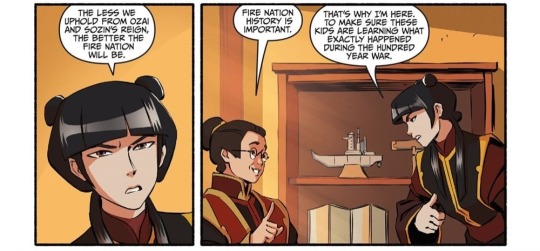
However, I don't think it's as much of a heelturn as one would believe at first glance.
Mai is a difficult character to pinpoint on some levels, particularly due to her upbringing which stripped her of a lot of her self expression. I think most of the fandom underestimates the trauma and effect of Mai's upbringing. I elaborate on it here.
However, the long and short of it is that Mai was not encouraged to question, criticise or, god forbid, rebel against her enviornment. To the point where her parents scared her with stories of spirits that would kidnap her if she misbehaved.
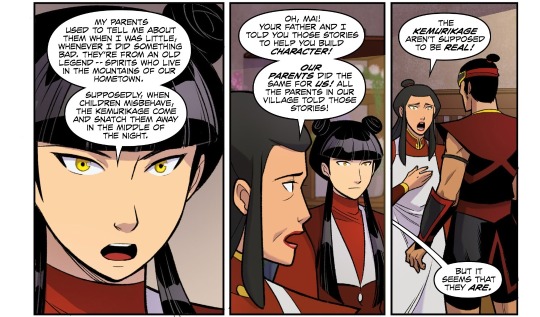
Ukano's involvement in politics and relatively high status should also be taken into account. Mai would have grown up being strongly encouraged to conform to her father's beliefs and go along with his politics.
Mai : My mother said I had to keep out of trouble. We had my dad's political career to think about.
We've seen the propaganda and indoctrination of the Fire Nation school system, how it uses misinformation in its curriculum and how it punishes deviance.

Most fire nation children won't have the tools to find the cruelty and danger in the philosophy of the Fire Nation. Zuko had to get banished from the country to even start his deconstruction. And he had Iroh at his side to guide him.
It's not shocking that Mai would not be able to see the flaws of the Fire Nation. Despite this, she still shows no attachment to the Nation's cause, either. In fact, she actively refused to take part in the war effort when she thought she could get away with it.

I don't think Mai had much sympathy to the other nations, nor will I claim she secretly harboured anti imperialistic sentiment. I simply want to state the fact that Mai was, from a young age, forced to do things she didn't want to do and conditioned by multiple parties, to accept this. Mai has been trained to be passive, with only the method of passive aggressiveness and gloominess to defend herself.
I think after the fall of Ozai's rule and the slow restructuring of the Nation, Mai got more freedom in her life. Ukano's political role diminished, so Mai was allowed to think for herself. She gets to discover the world more and develop her own thoughts and ideals, rather than the ones she'd been forced to conform to.
This line in the upcoming comic seems to confirm my thoughts:
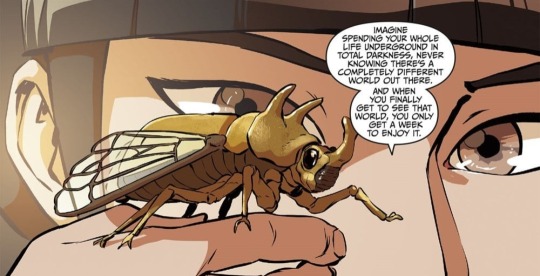
Mai's upbringing is the underground and darkness. She was never given an alternative or agency in her life. And thanks to Zuko, she was able to see and experience a different world than the one she was brought up with. She is able to help to try and achieve it.
Initially, Mai is angry at Zuko's joining of team Avatar. She feels betrayed and upset that he did not talk to her in person, even if it was to protect her. And yet, she saves him. While I believe that most of her motivation was genuinely out of love for Zuko. But she also, ekther inadvertently or deliberately made the choice between Azula and Zuko. Between the two potential duture leaders of the Nation.
And she chose Zuko. Who is not only the boy she loves, but also the boy who can heal her nation.

There is an argument to be made about how Mai represents the Fire Nation itself and its relationship to Zuko, but that is a topic for another day.
The theme of Mai caring for the future of the Fire Nation can be seen expanding in the comics. As 99% of the fandom will tell you, the comics have their flaws, but I do enjoy their handling of Mai for the most part.
I think it's interesting that we are shown that Mai not only wants Zuko to be Fire Lord, but for him to be a good Fire Lord.
We see her dissapointed in Zuko secretly meeting with Ozai. At first glance, what she says to Zuko is that she is dissapointed in him keeping secrets from her, which is understandable, since the last time he kept a secret from her led to him joining the opposite side of a war.
However, with her next appearance, we see that Mai may have had another concern relating to Zuko's communing with Ozai. When Ty Lee informs her of Zuko also enlisting Azula's help, Mai exclaims 'so he really is turning into his father', which seems to denote that Mai has a distaste for Ozai and his rule, whether that be from the begining, or recently acquired.

Mai also criticises Zuko's callous and controlling restrictions over the frightened townspeople. This serves to further cement the idea of Mai becoming disillusioned with the similarly inclined authority figures of her past. Authority figures who were a symptom of the Fire Nation's utilitarian and imperialistic system. We see this disdain manifesting in its full force in the teasers for the upcoming comic.
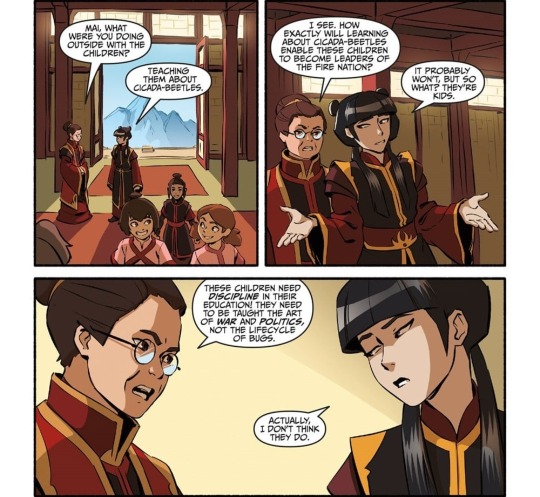
I think people tend to not realise how restricted in her self expression and thoughts Mai was, despite all the puzzle pieces being laid out for us in the show.
Mai has gone through a very quick and yet realistic episode of character growth in my opinion. Not unlike a lot of people raised in heavily Conservative and restrictive households who peel off later in life, she's settling into her own mindset and motivations.
Ans I don't think it's an unrealistic idea for Mai to want to help change the education system. The Fire Academy for girls is where she met Azula, and as an all girl school alumni, I can tell you first hand how toxic and confining these enviornments can be.
While Mai may not be seen as a particularly empathetic or kind person (though I think this interpretation is flawed), she can sympathise with the young girls who will be placed in the shoes of her younger self.
She can want to not see these kids go through what she, Ty Lee AND Azula did.
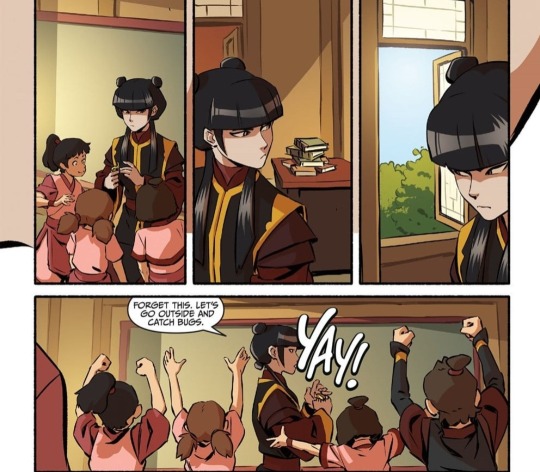
[The panels of Mai glancing between the stifling interior of the school and the open window and choosing to go outside and lead the Nation's youth outside... ugh]
Not only is this a rather logical progression for Mai's character, in my opinion, but it also feels like a very big 'healing your inner child' moment for Mai. Since she was not really seemingly allowed to be a child, as most children in the Fire Nation appeared to have such restrictions placed on them.
I don't think it's much of a stretch of the imagination that Mai would want to have at least a small part in dismantling the system that harmed her and so many other children of the nation.
She is a young woman now, she has grown from the oversheltered, apathetic teen she was in the show. She has been able to make her own informed opinions about the state of the nation, has been able to hone her trauma into determination. And it seems we're going to see the fruits of this development in "Ashes of the Academy".
I have very high hopes for the upcoming comic, since what we've seen of it appears to make a compelling story, one I relate to deeply, as well as a good study of Mai, a character I find often misinterpreted by the fandom.
#'this is out of character' my brother in raava let me tell you about this cool thing called character development#mai#atla mai#mai atla#zuko#azula#ty lee#ashes of the academy#pro mai#pro maiko#avatar#atla#avatar: the last airbender#the last airbender#avatar the last airbender
820 notes
·
View notes
Text

hello!
we're worldwide noises. we are a teenaged plural system of indeterminate number, and this is our blog. what's it about? nothing. just like seinfeld! click read more to find out more. warning, we overshare. a lot. read through the full thing to find the thin ice and dni lists respectively. and do not send us donation asks, especially if you're anonymous. we don't know which ones are real, and which ones are not.
there is also a more in-depth post explaining our stances in a simple format.
we (raz/lain, shi/hir pronouns) are white, mesosex, and collectively queer + oriented aroace & genderqueer. also freshly eighteen years old. don't be weird to us.
we are also taken, so please don't flirt with us romantically!!
we're medically diagnosed and/or recognized for: autism, adhd, anxiety, major depressive disorder, (c)ptsd, disruptive mood dysregulation disorder (a precursor to bipolar in most cases), unspecified dissociative disorder, and mild asthma. we also suspect to have idiopathic hypersomnia, dpdr, bpd, hpd, and some narcissistic traits — all with extensive research.
in short, we're fucked.
the part who will front the most & post the most is nec. i'm also the one writing this right now. although, i'm looking for different names for myself. i use shi/hir, vei/vein, and hy/hymn pronouns. i'm a gender non-conforming boygirl, as well as aroacespec and a bi-abro lesbian. and objectum and fictorose, just to add more to the fire.
i'm the one who has the out-system boyfriend... and the one who takes the brunt of our disorders. thanks chat
i'm very autistic about my interests! i love things such as: psychonauts (special interest of 3 years), dandy's world, vocaloid (including utsu-p, pinocchio-p, and the post-traumatic manifesto) (the latter being the theme of this account!), object shows, roblox, pokémon, and more! chances are if you've heard of something somewhat popular yet niche, i've been in the fandom or at least heard of it. share me your playlists! i love playlists, and have around 30+.
however, there are things i don't like. obviously. everyone has dislikes or even hate for things.
fans of vivziepop, dream smp, necrojimbo/analbonez, true crime community, alfred's playhouse, the coffin of andy and leyley, and hoyoverse content are on thin ice. all of these creators have absolutely been shown to be bad or at least questionable people in the past and present, and i'd rather fans of them remain wary. and the true crime community is just weird. there are families of murder victims out there on the internet seeing that shit, come on now. it's just immature and sickening.
and for people i don't want to interact at all,
i don't want these groups to interact with my posts or blog at all: zionists, darkshippers, pro contact for illegal paraphilias, radqueers, anti non-traumagenic systems, and anti-inclus. anti-inclus for me includes terfs (and by extension, radical feminists. y'all's ideology is full of bigotry whether you like it or not), and people who are against contradictory or "weird" labels. my blog is not for you! i will block you if i see you in my notifications. as someone who is queer, not fully traumagenic, a victim of countless horrible things, & more, i don't feel safe around you guys.
now uh. have fun don't die 🔥 here is my umm. dni banner too
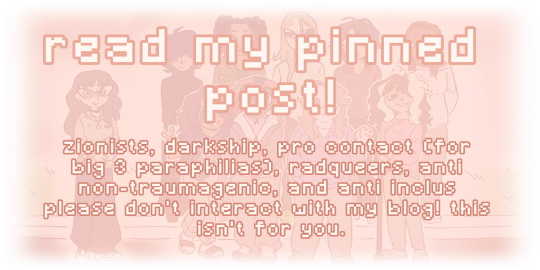
#intro post#liomogai#endo safe#pro endo#anti rq#how do i tag this#seriously i've used tumblr for over a year and still don't know how#this is bad
13 notes
·
View notes
Note
The fact that Dave Filoni called Anakin “the greatest Jedi ever” is proof that he’s bias AF. His anti-Jedi rhetoric is bupkis.
I wonder if he means "the greatest" in terms of in-universe fame...?
Dunno if this is the case in Canon (then again Dave Filoni blatantly ignores any *non-motion* transmedia elements in Canon so meh), but in Legends he's:
"Anakin Skywalker, the Hero with no Fear™, handsome, dashing, the face of the Republic's army during the Clone War, the only Jedi who tried to resist the nefarious Order's coup and was treacherously murdered for it".
And I seem to remember that, in Canon, he's like the Jedi Temple's superstar anyway, every Jedi recognizes him on sight. I mean, that line from Baylon about "Anakin speaking highly of Ahsoka" must have some meaning beyond artificial personal stakes.
So from a fame and a "power level" standpoint... sure.
He's the greatest.
I'm giving Filoni the benefit of the doubt.
While I've talked about why Filoni's entire headcanon about the Jedi doesn't track with what George Lucas' intended narrative, I think it's worth acknowledging that Filoni's bias comes from part of his duties while directing The Clone Wars was.
One of the goals of TCW was humanizing Anakin, expanding upon his character make him go from "a character whose only purposes is to embody the themes presented in three movies based on the matinee serial format" to a relatable person, a good man, the hero Ben mentions to Luke in A New Hope.
I think it's normal that he'll see Anakin in a more positive light.
Also (and full disclosure this is just me theorizing I am no authority on any of this so if turns out I'm wrong just come right out and say so)...
I'm pretty sure that Filoni, Lesley Headland and most of the recent Star Wars authors are all Gen X, raised by baby boomers forced to conform to society, obey authority and have proper decorum (boys don't cry!) all of which they strove to rebel against. Add to that the corruption they witnessed growing up and coming out of high school, and you see a kind of jadedness emerge. "The rules aren't as black and white, the world is grey."
So while most of them and the boomers despised the Prequels upon release, a few of them projected a more individualistic headcanon onto those movies that fit with where their head was, at the time.
As such: Anakin isn't interpreted by them as a cautionary tale about what happens when you're greedy. He's a misunderstood rebel, a non-conformist who has his flaws but is ultimately good at heart. Which isn't entirely inaccurate, but it is very clearly an embellishment of a character who will one day become a space nazi.
The fact is... the Prequels were made by a boomer. One with very liberal values and who was himself a rebel, but a boomer all the same. The whole point of his story is...
"we all must come together and fight as one, if push comes to shove; we must all be compassionate and selfless if we are to survive; don't be greedy, let people go when it's their time to leave".
And then he makes the Jedi say that, making them beacons of truth and good and compassion in his fairy tale, now aimed at Gen Z kids.
Gen X-ers hear/read that and project all the boomer BS they had been told onto the Jedi...
"oh, so the Jedi are saying you shouldn't love yourself, you shouldn't be yourself, you should give up on what makes you an individual to fit in, you shouldn't feel any emotions"
Because nobody is that good, realistically, right?
This happened in other mediums. The one that comes to mind on the spot is the relationship between Mufasa and Scar.
In The Lion King, Mufasa is strong and noble, Scar is weak and conniving. Simple enough. Around that same time, in A Tale of Two Brothers, young Mufasa is shown to be pretty nice with Taka (Scar), who is framed as a spoiled brat to begin with.
Skip to the 2019 remake, and it's hinted Mufasa gave Scar his wound, and in The Lion Guard they explain that Scar got his nickname from Mufasa mocking him for a misadventure.
He went from being a noble king to a bully who had it coming, Scar is an underdog who got picked on. Because again: nobody is that pure, right? Fairytales be-damned.
Nothing is black and white, it's all grey.
So yeah, long story short I do think that Filoni being part of the generation that wasn't the target demographic but was old enough to retcon the crap out of the Prequels also plays a role into his view of Anakin.
#made it too long#i beg someone with actual knowledge on the subject either confirm or deny any of the above#QnA#Anakin Skywalker#long post#dave filoni
248 notes
·
View notes
Text
Alright new ATSV discussion:
No Expectations
Alright so we all remember the infamous “No Expectations” graffiti done by Miles in the first movie, made to express his feelings about now growing up with everyone having these expectations of him.
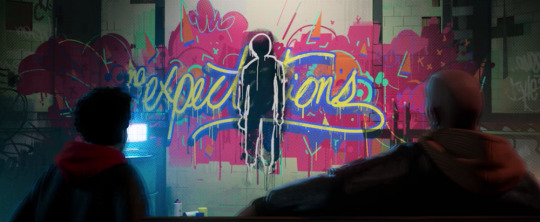
That was a main theme of ITSV and continues into ATSV. Miles is expected to keep good grades at this new school, he is expected to be able to do big things, but also once he is bit, he is expecting himself to become a great hero in such little time, and those high expectations he gives himself are crushed by the low expectations of those around him (Gwen, Noir, Penni, etc). It’s not his own drive and expectations of himself, but the expectations of others that bring him down, the idea they had that he was just a kid, that he was not ready, but when it came down to it, he proved them wrong, he saved the day, he sent them all home.
Following this into the second movie. The expectations now of his parents wanting him to be this perfect kid, to do what they think is best for him even if he doesn’t think so. Miguel and the rest of the Spider Society having the expectation of Miles to listen and stand idly by whilst The Spot takes everything he loves. The expectation to be Spiderman, to make those big sacrifices, even as a kid.
But no, as he says, he’s going to do his own thing.
Now back to The Spot. Many people have pointed out that he looks eerily similar to the Graffiti in his final scene.
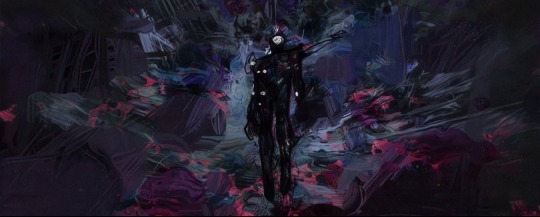
The crooked stance, the black and white figure with the colours all in the back. Only difference is the colours are darker, more dull, and scribbled over. It gives almost an anti feel to it all. As it’s stated in the art book, Miles and The Spot are characters meant to mirror each other. They are two halves of a whole and compliment one another.
The Spot is the expectations. And not just the expectation of Miles to be Spiderman, to push aside his youth and innocence for the sake of others, but also the expectations of himself to become nothing but a villain.
The Spot was isolated from society the moment he was merged with the dark matter, in his own words, his own family wouldn’t even look at him, he was shunned. It wasn’t his fault and he had no control over what happened. We also know from the art book that he wasn’t really taken seriously by his peers as a human either. He’s spent his whole life chasing approval and wanting to live up to peoples expectations. And now the only expectation he can achieve is his own to become Spider-Man’s nemesis, to finally be taken seriously, to be the only thing society has left him to become.
Miles represents growth and change, that freedom of making your own choice, of being who you want to be
The Spot is conformity, twisting himself into what he was forced to be.
I Hope this made sense, feel free to leave your thoughts!! :DD
#I have no idea if this made any sense#I really love analyzing these films#across the spiderverse#into the spider verse#spiderman#miles morales#the spot spiderverse#the spot#film analysis#discussion#discussion post#film#spiderman into the spiderverse#spiderman across the spiderverse#jonathan ohnn#johnathan ohnn
84 notes
·
View notes
Note
What upsets me the most about the dumbass Sansa vs Arya thing (other than it only existing because antis hate Sansa that much) is that... what does it add to the story? This isn't fandom stuff, this is something antis genuinely want for the story, but what does it ADD? What is the POINT? What value does these 2 siblings fighting against each other would give to the story? To the message and theme? It's even more worthless than the boring Cleganebowl shit.
Sansa and Arya, two siblings from the main family of the series that the story centers on, fighting and hating each other is detrimental to literally EVERYTHING. ASOIAF is LOADED with family dynamics that are actually toxic and destructive to the members. We have the Targaryens, we have the Greyjoys, we have the LANNISTERS. Westeros is so bereft of families that love each other, making the ONE family that genuinely love each other and doing their best to reunite hate each other is so... just spit on GRRM and the effort he put into House Stark, why don't you?
I don't want to sound like a pretentious ass, but these people should not read a series like ASOIAF if they're gonna let their petty feelings and opinions impact the series as a whole. They can hate Sansa, but if they hate her to the point where it impacts their reading of the series, then put it down and go read something simpler. Or just stick to fanfics because their disturbing hate fantasy will never be canon, sorry antis
(about this ask)
I talked about this before and now can’t find the post, but Arya and Jon fans who hate Sansa are holding her responsible for the problems with society that Martin is criticizing. They are missing that society is being criticized from different angles to allow us to see all the ways it’s hurting people. Rather than realizing it isn’t the little girl who caused their pain, with them we are getting two critiques (coming from different directions) of their world. Jon is excluded, Arya is expected to conform.
Jon wants in, Arya wants out.
And of course, Sansa suffers as well. She may fulfill the ideal in a way that Arya cannot, but that doesn’t save her. We have Elia and Lyanna which is another picture of conformity/non-conformity —both of them die. There is a much larger part of the story here that is the driving force of what these characters suffer, it’s a shame to dismiss all of that in order to hate on Sansa.
I have no gatekeeping instinct. I’m happy to read different takes (within reason — absolutely no Sansa hate which is why I don’t do much with anyone beyond our corner), I have read and written Martin critical stuff, I don’t mind people coming away with different interpretations. I enjoy that (within reason), and that’s a part of who I am beyond fandom so that isn’t gonna change. I simply decide, “well, I certainly never want to hear from that blogger/that part of the fandom again,” but as far as I know, they’re an angry 13yo who will reread the series in a year or two and realize, oh, the Sansa and Arya conflict is created by external forces, and actually, they can understand the pressures Sansa struggled with as well. I’m a big fan of leaving room for growth, and literature has a special way of allowing us to see things in new ways and helping us evolve as I individuals. I’d never be in favor of taking it away from anyone no matter how much I think they misunderstand it. You never know what the future holds and if one day, they’ll get it.
Also, I don’t have a perfect grasp on what Martin is doing myself. The endgame of some of the characters strikes me as….uh, less realistic, and more, whimsical, so unless I’m gonna throw out my books, I’m not gonna pretend to be more deserving than any one else. I will filter and block though because when it comes to Sansa haters:
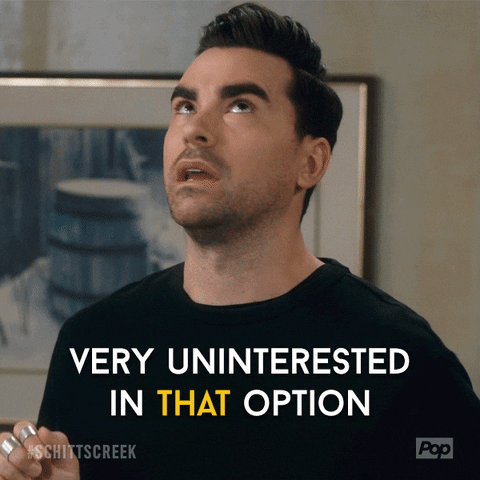
making the ONE family that genuinely love each other and doing their best to reunite hate each other is so... just spit on GRRM and the effort he put into House Stark, why don't you?
So, uh, not to annoy you further, anon, but I didn’t call what I had written “wish-fulfillment” for nothing. 😬 I definitely think expecting the Starks to kill each other is absurd, but as a Jonsa, I’m not sure how Arya would be able to accept that relationship, and I do wonder if it’s Martin’s way of allowing tension and conflict within the Starks even upon their reunion. Maybe I worry for nothing, but Jon is Arya’s person, he made her feel love and accepted, for him to be in love with Sansa…I worry that Arya would feel displaced, and how quickly Martin would find a resolution there.
Many others have previously looked at how Martin seems to have no problem writing brothers / guys having healthy relationships, but likes to have sisters at odds. There’s a dearth of healthy female relationships, so it’s an opportunity for him to break that pattern, and if Arya was accepting of it I suppose it could be a contrast to the Cat/LF/Lysa mess. That may be the goal he’s working towards, and to your point, that adds to the story in sadly lacking area. All the same, while I do think the Starks love and will be loyal to each other, I’m not sure how warm and cozy things will be on the page? I have some concerns about what he’s making room for. But that is the benefit of being in a fandom with so many emotionally mature fic writers who value and prioritize female relationships. I get to read healthy relationships either way!
28 notes
·
View notes
Text
"Baldurs Gate 3 proves the west finds sexuality in Japanese games appalling"
No. You aren't really understanding what's happening here. It is not a matter of the west approving its own sexualization in media and disapproving of Japanese because it's Japanese, just Asian, or foreign. This is a misreading of the situation.
It's actually the opposite. Anime and Japanese game FANS that have always been fans, HAVE ALWAYS LOVED that Japanese works were ALLOWED to have subject matter and themes without some angry radical feminist picking them apart, either demanding the companies themselves adhere to THEIR social standards, or trying to get the peer groups to shame consumers of the product and ostracize them so the individuals self-censor and don't freely and openly exchange this bit of culture with one another.
We used to have this freedom in the US, but then radical feminists swarmed in, decided certain things had certain meaning in accordance with their ideological viewpoints, and that if you ran afoul of their principles, you were a thought criminal and enemy of women by your own refusal to obey their beliefs. And so, even simply having bare breasts in a movie meant that at any time, academic feminists could write the equivalent of academic vagueposts talking about how one director and writer's decision to feature shitty dialogue and porn tier story was tantamount to the anthropomorphic loa of SOCIETY rubber stamping making women second class citizens, because a fictional woman was used for fun and profit for a story.
So to deal with the braying and hysterical nattering of the grass roots that actually listened to these ideological friends, as if these negative views were, "just their friends opinions" (more like the views of their new religion) to keep the peace, writing changed a bit to avoid invoking the subjects that'd get the angry radfems screaming and pointing at things to rebuke them for their supposed crimes.
And we lost the innocence of boob jokes, nudity, the assumed harmlessness and benignity of liberal sex and body humor, and had to add that dogmatic baggage about all men being craven abusive manipulators into how they were depicted and the "proper" way men and women should relate in fiction.
You know, the exact things that were missing in our diet of mainstream media in the west, that we consumed Japanese media to get into our mental diets, because the sheer stupid harmless and innocent FUN had been gatekept and freeze dried out of our media over here with endless discourse and antagonism by slanted critics that hated a work because it didn't carry water for their ideological beliefs, or exist as a ruinous slag for its defiance to that totalitarian bullshit.
The only overt sexuality that the Capital P Progressives would tolerate, was sexuality that "subverted the status quo." AKA, sexuality that works and media dominated by THEIR ideological principles owned. Sexuality that was dominated by LGBT themes and subjects. Sexuality that translated and interpreted heterosexuality through a 'queer' lens. That was the only sexuality allowed in games, because it was the only sexuality that wasn't "harmful, anti-feminist, cisheteronormic patriarchy." And so they reserved the right to shit on any work with sexuality in it that didn't fit their views of what was good and right and moral and "progressive" in their particular way.
Baldur's Gate 3 and before it, Dragon Age and its sequels. They were constructed from the ground up to adhere to the sometimes arbitrary principles and absolutely biased interpretations ("Our sacred thing, their shit.")
It's not that the games are Japanese. It's not that they're from Asia or Asian developers. It's not that Baldur's Gate is western, American, or 'white.' These are easy detours to make but they misunderstand the crux and true sinister behavior at play here.
They hate Japanese games that feature Japanese sexuality in media, because that media does not conform to their very exacting views of what "proper" sexual representation is. They hate Japanese games and media, because unlike their power base in the west, imping and co-opting things ala Sweet Baby Inc runs interference to make games more, "diverse" and "inclusive," they have no power to make the creative decisions that alter the entire game, its tone, its themes, its writing, its casting, its world, or the makeup and formation of the companies, the unions, or the national policies that tie them and their values into the industry at the fundamental level.
They hate Japan and its industry and its culture and its media because they see an opportunity to move in and start dominating the industry, or natter and nag it and make it seem like the west is grassroots rejecting or criticizing it from the perspective of a westerner. It's not true.
These people have taken over games journalism and the representative voices of the medium and industry and are effectively astro turfing the consumer base with their own disgusting interpretations of shit, to make it SEEM like the consumer and fanbase doesn't like it or are complaining about Japanese media in this way. When in fact, it's just a much more well obfuscated version of when the Moral Majority of the right wing/religious members of society tried to co-opt comic books, rock music and set moral and ethical standards for content that could be depicted, and to what age group.
It's THEM that create entire stupid ratings systems for games based on how "inclusive and progressive" they are, deducting points for women not being lead characters, deducting points if a work of literature features sexual violence at all, deducting points if there's no queer people visibly queering queerly as part of the main story you have to interact with, preferably queerly. And THEM that are trying to simultaneously maintain an aire of, "white people shouldn't be allowed to criticize not-white/foreign cultures and literature," and "Japanese society and culture is patriarchal and shit and wrong tho."
These people exist in the west, but they do not REPRESENT the true opinions of the consumers and people of the west. But they're effectively a group of charlatans we can't get rid of or wrangle in. They were taught guerilla cultural warfare, subversion tactics, and conspire to get in on the ground floors and board rooms of entire industries before making themselves visible, with people acting as mycelium agents from inside other businesses clandestinely to make that association seem organic.
It's them causing this disturbance and shit. Not "the west." It's a conspiracy of assholes. It's them trying to be the gatekeepers that get to then put their guys into place as voice actors, markets, editors, and localizers, based on those principles.
So a real life woman in a Japanese game greenscreened, a sexy and conventionally attractive woman, gets called some sort of neotonous underaged oversexualized doll, while they deliberately try and go for the most androgynous to gender ambiguous depiction of femininity in the west on purpose, due to beliefs that will somehow "lower western expectations of femininity to be more realistic."
It's just unfortunate that Japan has to deal with this without really understanding just how bad it is a problem to deal with. We can't even really contend with it because proving these people are conspiring on an ideological basis is very difficult, even if they do slip up every once in a while.
13 notes
·
View notes
Text
Something New To Read
Last week, I asked people to go find their New Thing.
But I know people. They either won't go in blind, or have no idea where to start. But hell, I'm career library, I know from books.
So I'm just going to start throwing out recommendations of things I think are good reads. And I encourage everyone else who rebagels this to add on. Let's expand our horizons!
First off, after seeing the "werewolf family" post going around again, I would be remiss if I didn't recommend Full Shift by Jennifer Dugan and Kit Seaton. This is a YA graphic novel about a teenage werewolf navigating her personal issues about herself, how she doesn't seem to fit with her own family, and the complications of being in love with a normal human girl. Your mileage may vary on teen drama, but I guarantee you'll love Tessa's sprawling extended family and the worldbuilding.
If you prefer witches and magic, the same authors wrote Coven, which is the same world, also has a queer protagonist, and is about an extended witch family and the crisis they're facing.
In Juvi graphic novel territory, we have The Witch Boy (and its sequels) by Molly Knox Ostertag, which is about gender non-conforming with a magical twist. Aster is from a magical family. And traditionally, females are witches and perform magic, while males are shifters, transforming into their animal. But Aster has no shifting ability, and is drawn to witchery.
And yes, I'd recommend everything else on the author's list as well. It's all good stuff.
For prose novels, we have the Wings of Fire series by Tui Sutherland. 17 volumes in the series, four novellas, a guidebook, and a graphic novel adaptation that is up to book 8. It's the first dragon story I've encountered where all the characters, our point of views, and the world is from the dragon perspective rather than "dragons as viewed by humans." There are three story arcs, with themes on the terrible cycle of violence, the importance of understanding and appreciating other peoples and cultures, and how hard and complicated it is to fight against injustice, and how important it is to do so anyway. I can't stress enough how this children's series, with its age-appropriate messages, was still way more nuanced and thoughtful about issues of racism, injustice, war and its horrors than a lot of adult novels I've read about the same subjects.
It *is* pretty violent for a children's series, and does not shy away from death, so be warned about that. There are gay dragons in the later books (including a main character who has her own novel from her own viewpoint.) Also there was an anti-woke backlash against the last novel, apparently for daring to include a non-binary human character. Which, if I hadn't already been a rabid fan, probably would have gotten me to check the series out.
I'll throw out more suggestions later. For now, it's your turn. What do you think people should read, and why?
2 notes
·
View notes
Text
Goth History-Episode 2: Gothic Fashion
Welcome back to my Second Episode of Goth History. If you're new to the @literaryxbones blog, don't worry! You don't have to look at the previous episode to follow this one.
Today we'll be discussing the history of gothic fashion: it's historic origins, connection to music, and its modern evolutions. Consider this a more generalized overview of goth style. There are many different iterative substyles that could warrant future entries.

Before delving into the contemporary goth scene, we must not neglect modern fashion's original, archaic influences. Stylistic inspirations date back to the Romantic Period. At the tail-end of the eighteenth century, people became disillusioned with the Industrial Revolution. They attached a sentimentality to nature, beauty, and simplistic living. Corporate technologies had long been eroding this traditional way of life.
As a result, discontent transformed clothing conventions. Dresses, vests, suits, and pants began to don elaborate, ornate patterns. Laces and ruffles exemplified its flair. A more restrictive, darker color palette of black, scarlet, purple, and brown was worn. The writings and dress of Edgar Allan Poe helped popularize the aesthetic.
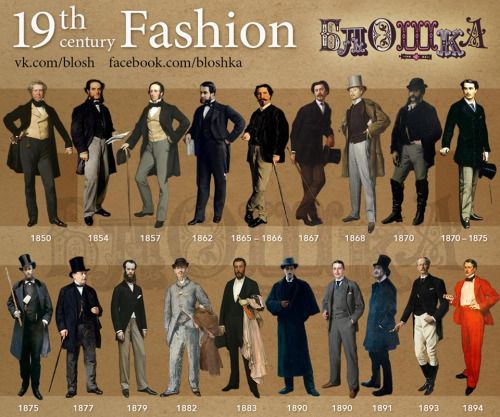
With the rise of the Victorian period, British nobility adopted the darkened elegance displayed by its counterculture. In 1861, Queen Victoria mourned her husband's passing. Ever since his death, she was only seen wearing black. With the public clad in funeral garb, the commonfolk and the royalty grieved together. The color black possessed a strengthened association with death.

In the late 1970's, a rebellious post-punk subculture emerged. An emphasis on individualism, non-conformity, and a dark appreciation pervaded in their fashion. Victorian touches remained in the jackets, fishnets, and expressive makeup worn by early post-punk bands. Siouxsie and the Banshees, The Cure, and Bauhaus flaunted this style on their tours.

A sprinkle of Punk-designer Vivienne Westwood's carnival themes cultivated the angular trad-goth makeup look shared all over social media today.
Bauhaus often used bat symbolism in their song lyrics and outfits. These nocturnal creatures are loved by many goths alike. Bats also recall to mind the Bat Cave, a London club.
I couldn't write about the history of our subculture's fashion without mentioning DIY. "Do-It-Yourself" attitudes were embraced by multiple alternative fashion scenes. Oftentimes, people thrifted, upcycled, and sewed clothing out of necessity. Younger members couldn't afford the expensive outfits worn by celebrities and made by fashion designers. Before online-shopping, most alternative fashion was inaccessible.
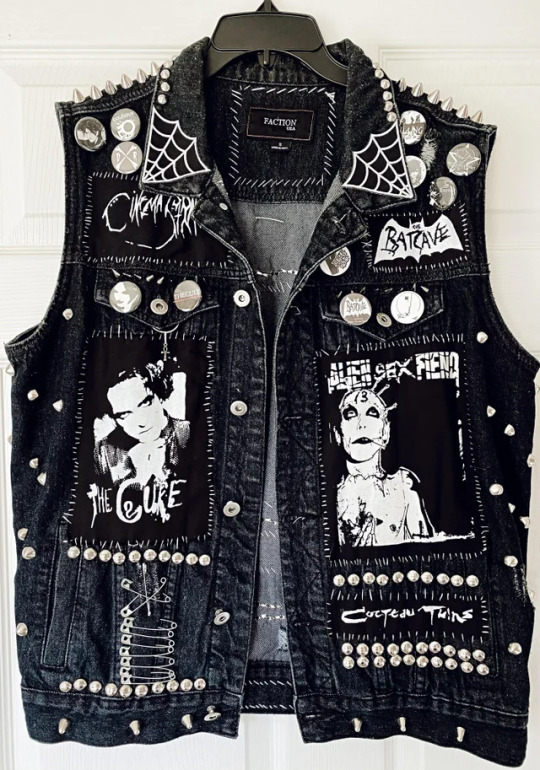
DIY also allowed for more creativity. Creations became an extension of the person wearing them. Goths chose from a variety of chains, collars, charms, and rosaries as accessories. They could implement these decorations in infinite ways. Different methods of distressing, cutting up, and patching clothes gave each piece a unique quality. Upcycling became an avenue for self-expression. People made what they liked.
In more recent times, second-hand shops and the DIY ethos has been centered around anti-fast fashion movements. Fast-fashion is when big corporations mass-produce a vast catalogue of items. Production is usually outsourced to other countries with cheaper labor costs. In these places, there are little regulations protecting workers. Popular sites for sourcing alt fashion like Ali Express, Shein, and Amazon use Chinese sweatshop slavery to produce their clothes.
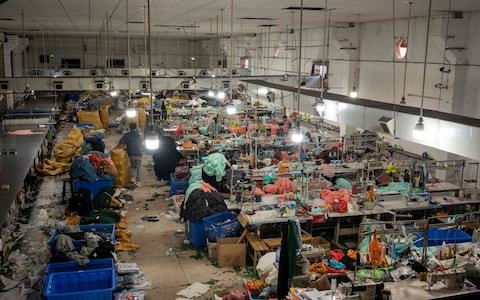
Overall, gothic fashion is catalyzed by scene artists, ethical dilemmas, and the creative spirit. Now, a ton of styling subgenres are gaining traction. Pastel Goth, Trad-Goth, Victorian Goth, and Cybergoth are just some of these newer terms.
It is important to remember that these styles are all goth, and that dressing to a certain aesthetic does not make you goth. Goth is in your heart. It's in the music you listen to. It's in the interests you find beauty in. You don't need to wear loud microtrends to have your identity recognized. Just have fun, wear what you want, and explore your own creativity.

Phew, that was a long post! Thank you for reading all of it. Maybe I could add in a prize for readers who read all the way to the bottom, like a hidden sticker or stamp you can use or something!
Sources:
A Fascinating Look at Gothic Fashion History and Its Roots – Midnight Hour
Gothic Fashion: Brooding, Forceful & All About the Black | FashionBeans
DIY Goth Battlevest Created by @Lord_Dagger on Reddit
Written by SORDID
#goth#gothic#goth subculture#alternative#goth aesthetic#writers on tumblr#goth style#retro#80s#alternative fashion#gothic fashion#goth rock#gothic music#gothic rock#gothic romance#gothic romanticism#gothcore#alternative lifestyle#alternative music#alternative rock#alt#alt aesthetic#altfashion#alt style#alt makeup#goth makeup#traditional goth#trad goth#goth music#80s goth
13 notes
·
View notes
Text
So RWRB was a movie with some discourse...
In all honesty, the discourse has bugged me more than any issues with the film itself. I get a film adaptation not living up to personal expectations set by a book is... a response that people have, but the fact some people have been trying to convince people it's not worth watching bothers me.
Don't get me wrong, I've seen all of the love for it too and I know the antis for the film are definitely in the minority. No one can control how anyone relates or who is allowed to enjoy a piece of media, but the sheer hatred I've seen from some of the people on here for the film hurts a bit to see. The arguments seem to be no deeper than "x character was removed" , "there's these plot holes" and "it's too formulaic" that last one of which I feel was kind of the point: it's a formulaic romcom so that queer people can have a fairy tale romance story like the straight ones that get shoved down our throats from a young age by companies like Disney. McQuiston, an NB writer, has gone on record stating that a huge reason why they write is to feature queer identities and make stories that people like them would have liked to read and feel represented by when they were younger.
If this was a straight Hallmark romcom (which tbf, it basically is in terms of story structure, and I low-key love it because of that) it wouldn't have made so much as a blip on most people's radars. But because it features queer characters the threshold for scrutiny seems to have been dropped to the floor (insert "Get Low" joke here). I can get having criticisms of the film, I have a few myself, but the attempt to convince people the film is bad and to disregard it as a whole because of them ignores the positive qualities, what the film means to people in the queer community, what its success can lead to in terms of representation for underrepresented people in the community (Ace, bi, NB, trans, etc.), and an understanding of intricacies that go into adaptation.
At the end of the day, this film was competently made (and in my opinion, well made) by a gay director with an inclusive team and a deep care for both the source material and an understanding of what the film would mean for millions of viewers. It featured experiences and themes that are common to many people in the community with several very poignant messages that actually have huge metatextual implications with the film (The "forced conformity of the closet" quote sticks out in particular to me: the number of op-eds speculating Nick and Taylor's sexualities and how they've been mum about them makes me think a lot of people missed that one; also looking at you, people that forced Kit Connor out of the closet 😒)
The film is a celebration of love featuring characters that people like me and others in the community can relate to. Is it formulaic? Yes. Did they remove some characters to try and create a tighter narrative focused on the main romantic pair? Yes. Is it overly cheesy and so unrealistically sweet that it will give me diabetes? Delightfully so.
So ending on a positive note, I just want to run down some things I've loved about it:
- An mlm story with an actual happy ending that features adult main leads! (Credit to youth stories, they're important, but as an adult it's hard to relate to teenage characters sometimes)
- The charisma both TZP and NG just radiate throughout the movie
- Sarah Shahi eating the absolute SHIT out of every scene she's in (Touch her and die)
- Same for Rachel Hilson
- Uma Thurman and Stephen Fry (enough said)
- The acting overall was fantastic
- The care and work put into intimate scenes and inclusion of an intimacy coordinator
- On a personal level, I loved seeing parallels between Alex and Henry's relationship and the relationship I have with my husband. For the first time in my 30 years I actually see a little of myself in an uplifting and happy piece of media and not portrayed as a dramatic tragedy, villain, or inconsequential background character.
Tl;Dr if you didn't like the movie, that's your opinion. I'm not here to try and convince you otherwise. But please stop trying to convince people it shouldn't be watched. Regardless of your opinion, this film means a lot to a lot of people, including the author of the original book! Just let us enjoy this imperfect, but tasty cheese with our w(h)ine ❤️
#rwrb#rwrb movie#red white and royal blue#taylor zakhar perez#nicholas galitzine#firstprince#alex claremont diaz#henry fox mountchristen windsor
33 notes
·
View notes
Text
an old formula that once made shows about the Supernatural so fun and interesting, the theme being a Universal God(let me explain folks)
too many shows about Angels and God these days seem to follow an anti Christian agenda which seems very much on purpose due to people's religious traumas but also some people are really just complete satanic assholes(but that's a topic for another discussion for another day lol, I digress), so anywho, most shows these days that deal with Angels and the Supernatural are very strange and twisted because their goal seems to be more of a mockery of Christianity which is so not cool
I totally understand if people have religious trauma, but that's not Jesus' fault, people shouldn't hate a certain group of people just because a few bad apples were buttholes to them
too many shows these days seem to have the same reoccurring message "God must be a villian, lucifer was framed", but that's a bunch of bullshit
I think what would be really helpful is if there were new tv shows that focused on using the theme of the story being this, a classic formula that once made so many shows so good and interesting and they had the power to open up people's hearts and minds about God and Angels and Spirituality instead of doing the opposite, that theme was the Universal God
as someone who is a Queer Christian, I do believe in a Universal God, that means that I believe in a God that predates man made religion, I believe in a Christ that predates Christianity, I believe that can use anyone to deliver a good message, I think Messengers and Messages are all around us everyday, we just have to know how to use our spiritual eyes instead of our human eyes, do you see where I'm going with this?
even good stories that have nothing do with Christianity can have Christians themes in them by accident or on purpose because if someone is a good person, the Universal God of Oneness is inside of them(the latest example I saw of this was in believe it or not, Deadpool and Wolverine, that's right, the 3rd Deadpool movie) because Super Hero movies are about doing the right thing, helping people and so on, accidental Christian Themes are bound to pop up, this is what I call everyday evidence of a Universal God, God isn't only associated with Christianity but also other religions and even no religion what so ever
to go far back, does anyone on here remember that tv show from the early 2000s called Joan of Arcadia? it was a Christian TV Drama but it featured themes of a Universal God, meaning, this portrayal of God in the show was an accurate God, God is not just a Christian figure, he/she has always been around and has always been a symbol of Love, God wasn't always a tyrant, this is a very harmful myth that fake Christians have used to hurt others who wouldn't conform to he catholic church and so on, but I digress
does anyone see the point I'm trying to make here?
pureflix doesn't turn people's hearts on fire for God, it only separates people from each other even further more
Super Hero Movies and TV Shows where everyone's perspectives come together and there are themes of a Universal God? now these are way more Christian than the God's not dead series(that series had good intentions at first but then become a joke of itself)
I think if more Christian content had themes of a Universal God than just repeating the same old junk content then we would see better tv shows about Angels, no more lucifer, no hazbin hotel(hopefully lol)
I have complaints about both Christian and Secular content, but I love when both sides can have a reoccurring theme of a Universal God
now that's a God that we can all get behind and it's a God that I 100 percent believe in
#ask me anything#Universal God#God Loves You#God is Love#Christian Discourse#writeblr#Heroes#good writing#bad writing#real christian#Queer Christian#Progressive Christian
2 notes
·
View notes
Text
Theory: Saki may be marrying someone else, but Mai is still in love with Saki.
(Disclaimer: I have nothing against and in fact support all the actual canon ships, and I'm okay with Takkun, even if he's deliberately a faceless nobody because the show is about the characters we already know. Please do not flood the notes with shipping discourse. The tag is full of that already.)
So when we meet Saki and Mai, they are both in relationships, but while Saki is engaged to Takkun, Mai and her boyfriend are on the outs. In her focus episode, Mai is encouraged, even by Saki, to talk things over and try and fix it, but when she gets dumped over text message, all Mai feels in the moment is relief. She immediately feels guilty over it, because shouldn't she be sad? Isn't she supposed to want to get and keep a boyfriend? Isn't she supposed to want it more than she wants to succeed in her career or reconnect with her friends or the other things she actually cares about? The others (save Rin) are all either happy in their relationships or putting in effort to save them, so why does Mai just feel relieved of a burden instead when she loses hers?
This, gentle readers, screams comphet. Not in the way that some Sakimai shippers are making the rest of us look bad by insisting that Saki's relationship with Takkun is straight-ironing on Toei's part (that's bi erasure, by the way, or have you forgotten Kazuya?), but in-universe societal pressure on Mai to not question who she is and conform as best she can. This isn't enforcing the idea that liking other girls is something you grow out of. Given the themes of the show, this is condemning it.
Think about it. The others each deal with their own complexes, from Nozomi being told she can't move heaven and earth to support a child's dreams to Rin caving to the pressure to ignore a Shadow and focus on saving her career, each coming to a head with the character trying to rationalize her failures and caving to what society told her to leave behind and grow out of by saying "things are different, I'm not a kid anymore." Mai, in this light, is dealing with the same thing. While, unlike with the others, she still can't transform after her focus episode because Saki still needs to deal with her issues, Mai moves forward learning that even if no one else understands, it's okay for her to be okay with not being with a man she didn't love anyway.
And speaking of Saki's focus episode, it's called "Their Bond." Saki and Mai are two of the few characters who stayed close their whole lives. They still go out a lot and talk to each other about their feelings, and when Saki isn't talking about hers, Mai starts to realize what's wrong. She's the one who makes Saki face that she has her own dreams that she's afraid to chase because they'll get in the way of the important people in her life.
And when Saki starts to worry about what studying abroad might do to her parents and her fiance, Mai says that if she were the one marrying Saki, she'd want Saki to be happy. She isn't saying this to try and steal Saki away, of course. Again, she does want Saki to be happy with the person she chose. But it's an interesting choice of words, especially considering that at this point, the creators had had to make a statement about Otonapre being "only a possible future" because of all the shipping discourse surrounding the show, particularly from Sakimai fans (Coconozo and other frequent targets of antis don't get nearly as much hate in Japan).
Most importantly, when Mai asks Saki to try to transform again? Saki breaks down and gives the same "I'm not a kid anymore" lines that the others had given, but specifically, she thinks of her engagement while telling Mai she's "not the same person." These two are close. Close enough that the people rioting over the sunken ship almost feel like they have a point. And while Saki had been among the people telling Mai to just patch it up with her now-ex-boyfriend, Saki is also the person most likely to know what Mai is feeling at any time, especially when Mai just told her "if it were me" like that.
It seems pretty clear that while Saki feels she's letting down her parents and her fiance, she also thinks she's letting down Mai because she's figured out in this moment that they don't feel the same way about each other. Can their bond really survive that? But just as her parents and fiance are fine with her decision and just want her to be happy, so does Mai, and their bond does survive that. Even if Mai knows how Saki feels, Saki is, as Mai says, still the same person. And that's when they can combine their powers again.
In conclusion, Karekuru and (if Hugtto and anniversary merch apply here) Nagihono aren't the only reasons that Otonapre isn't a sign of straight-ironing ahead. And also I'm surprised I haven't seen more people starting to ship Mai rebounding with Rin. Maybe once we finally see adult Hikari.
9 notes
·
View notes
Text
This approach is so tone deaf that I'm facepalming.
They keep acting as if those evil evil boys are being brainwashed by Andrew Tate and Alex Jones because of weird mind-perverting fascism rays shooting out of their smartphones, and that's why they need to mandatorily shine counter-propaganda into their faces while banishing "harmful" figures from the algorithm. It's utterly psychotic. On par with the state trying to banish LGBT themes for fear it'll "turn the kids gay."
Except, ideologically, the people trying to own the pillar of progressivism, are demanding everybody bow to one specific interpretation of how anti-racism, anti-sexism and anti-gender bigotry works, under what pretense, and if you don't conform to that specific model, you're just in favor of concentration camps and white supremacism. To the tune where if you disregard their absolutist vision of privilege theory, class struggle their and other self-masturbatory old wives tools of "analysis" (nothing of the sort), then they declare you to just be a bigot.
The election results do not even show that the country is getting "more right wing." At least, not really. The results show that the very un-liberal people using beliefs and standards rooted in Marxist dialectics and philosophy are trying VERY hard to express dominance over the party and how it drafts legislation on what grounds, and many otherwise liberal, progressive people rejecting that, leaving them without a home.
It's showing that while not being democratically elected so much as appointed and sneaking around democracy in the democratic side, the hard-left are alienating many young men by telling them THEY are the problem, whatever they do, and that they shouldn't get a say or be treated like equals because "their demographic oppresses women." They get shouted down and shut out of any discussions among leftists based on this, purely on the basis of, "YOU'RE PRIVILEGED, NO SPEECH FOR OPPRESSORS. SHUT UP. CONFORM OR GO SIT WITH THE REPUBLICANS."
Not only does it drive young men away from the left, it leaves them feeling like maybe the only place for actual anti-discrimination is the right wing. How do I know? SURPRISE SURPRISE, THEY'VE BEEN DOING THIS BULLSHIT SINCE THE 80S, BY MY WATCH!
And then they have the audacity to twist and spin these figures this way to make it seem like maybe American boys are just going "HRMM THIS FASCISM THING SURE SOUNDS GREAT I LOVE WHITE SUPREMACY AND HATE MINORITIES."
This gap they could conceivably be falling through, which is a fraction of the size they're describing it as, is a gap of their own making, specifically to poison the well of just whom and why they have opposition. And full impunity to characterize those whom disagree with them.
And this is why Trump&Co. continues to win, and why the liberals will eventually kick these hard-leftists out of their avenues to affect the party. They're revisionists and biased, borderline liars, deliberately cooking the figures trying to make their echo chamber fantasies about Nazis growing like fungus on every surface, every wall, in every corner.
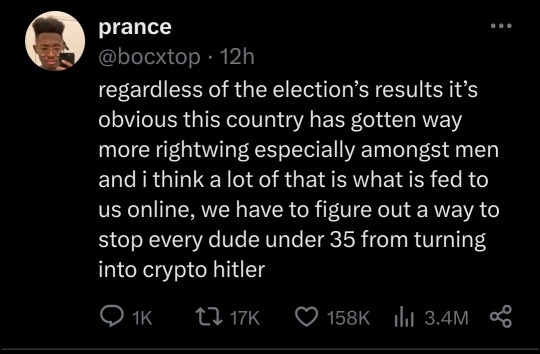
I couldn't have said it better myself.
97K notes
·
View notes
Text
i do love Playing In The Space but like.
when you talk about media. there is a noted difference between (this can be interpreted as XYZ/potentially has XYZ themes) vs (this was written with the intent to showcase/highlight/discuss XYZ). and like. just be careful recommending people things based off the former.
the former is definitely important, because solid analysis through a new lenses is #Awesome and for every one Explicit Thematic thing there's probably 10 implicit things to be derived from because of the author, the time period, the culture, what other works it is in conversation with, and that shouldn't be ignored just because it wasn't in the synopsis.
but like. the latter is definitely important.....more specifically because of the 1:10 rule. Like just because the evil villain of an RPG is a church, I wouldn't necessarily recommend it as a work critiquing religious institutions, especially not after they reveal the entire institution is run by parasitic mushrooms that rids the villains' of all responsibility and thus distorts the pre-existing elements into "im glad this is the case born from extraordinary circumstance and could never ever happen in Real Life :D" (a common case within certain works....), you know?
this happens a lot with things that dip into things that could be considered anti-capitalist, anti-conformity, feminist, etc but ultimately Says Nothing/Makes No Stance because it was ultimately just used as a prop for the author to get to What They Actually Wanted to Do without any greater intent, or or alternatively they Take A Stance regarding X topic that contradicts the previous elements laid down. both author's and interpreted purpose is important and you should always 1) be ready to know that There Will Be People Who Challenge Your Interpretation (whether it be they have alt interp + stick to authorial) and 2) you can't really control the interpretation someone else gets out of a work unless you railroad them hard.
anyway *back* to the idea of recommendations based on interpretation + derived intent. i think with friends its fine, especially if you know your friend will probably take a similar stance. i think if its a recommendation sandwiched into a review or an essay-thing (things that clearly emphasize It's Your Opinion) is also fine but like... There are some people will just run into strangers and state what they believe As 1000% Fact about a piece of media and it gives me a headache ooooooooouuuuuuuuuuuuuuugh
#nova's rambling again#this is truly a incoherent ramble#this was inspired by seeing ppl argue about 2 Particular Pieces of Magicial Girl Media in a recommendation list#about the idea of the ability to find feminist themes in a work vs whether a work is Explicitly Feminist and the diff between them#i'll probably delete this later teehee!
2 notes
·
View notes
Text
The Philosophy of Rock
The philosophy of rock delves into the cultural, social, and aesthetic impact of rock music, examining how it expresses themes of rebellion, freedom, individualism, and authenticity. Rock music, since its emergence in the mid-20th century, has been seen as both a reflection of and a reaction against mainstream culture, and it carries deep philosophical connotations about art, identity, and society.
Key Concepts in the Philosophy of Rock:
Rock as Rebellion:
Countercultural roots: Rock music is historically tied to counterculture movements, particularly in the 1960s and 1970s, when it became a symbol of resistance against traditional societal norms, including authority, conformity, and conservatism.
Nonconformity and individualism: Central to the philosophy of rock is the idea of nonconformity—rock music often celebrates the rejection of societal expectations and the embrace of one’s individuality. This connects to broader philosophical themes about the nature of freedom, self-determination, and authenticity.
Freedom and Expression:
Liberation through music: Rock music is frequently associated with personal and political liberation, both in its lyrical content and in its rebellious, raw sound. For many, rock represents the freedom to express oneself without constraint, pushing against societal boundaries.
Breaking conventions: Rock's musical structure, which evolved from blues and early rock ‘n’ roll, often emphasizes innovation and breaking free from the constraints of traditional forms. This mirrors philosophical discussions about breaking free from conventions to create new modes of expression and existence.
Authenticity and Rawness:
Authentic expression: Rock music has often been seen as more "authentic" than other popular genres due to its emotional rawness and less polished sound. The philosophy of rock explores what it means for an artist to express their true self through their music, and how the genre values imperfection as part of this authenticity.
Struggle and emotion: Many rock songs deal with themes of struggle, whether personal or societal, and express raw human emotions such as anger, love, loss, and existential despair. This emphasis on the emotional experience of life connects rock to existentialism, which values individual experience as a key source of meaning.
Rock and the Body:
Physical engagement: Rock music is often visceral, appealing not only to the intellect but to the body, with its strong rhythms and loud sounds encouraging physical movement, such as dancing or headbanging. This suggests a philosophy that emphasizes the unity of mind and body and the role of physical experience in creating meaning.
Energy and power: The loud, often aggressive sound of rock conveys a sense of power and energy. Rock bands have historically pushed the limits of volume and intensity, leading to an exploration of how sound itself can evoke emotional and physical responses in listeners.
Rock and Revolution:
Political engagement: While rock started as a form of youthful rebellion, it has also been a vehicle for political messages and social revolution, from anti-war songs of the Vietnam era to songs addressing civil rights and gender equality. This aligns rock music with a philosophy of activism and radical change, questioning authority and societal structures.
Cultural impact: Rock is intertwined with social movements, and its influence extends beyond music into fashion, politics, and lifestyle, representing a revolutionary force that challenges societal norms.
Rock and Gender:
Masculinity and identity: The rock genre has historically been dominated by masculine expressions, often emphasizing aggression, dominance, and sexual freedom. However, as the genre has evolved, women and other marginalized groups have increasingly used rock to challenge traditional gender roles and present alternative identities and experiences.
Androgyny and subversion: Many rock musicians, particularly in sub-genres like glam rock and punk, have played with gender norms, embracing androgyny or performing exaggerated versions of masculinity or femininity to critique society’s gender expectations.
Aesthetic Innovation:
Sound experimentation: Rock music has been a space for musical experimentation, whether through the use of distortion, unusual time signatures, or blending of genres (e.g., psychedelic rock, progressive rock). This connects to philosophical questions about the nature of art, creativity, and the avant-garde.
Form and chaos: Rock often straddles the line between structure and chaos. Whether through lengthy improvisations in live performances or unconventional song structures, the genre questions traditional artistic boundaries, much like modern art movements.
Commercialization and Authenticity:
Rock vs. the mainstream: While rock began as a rebellion against commercial pop culture, it became increasingly commodified over the years. This tension between artistic integrity and commercial success raises philosophical issues about whether rock can still be a true form of art when it becomes part of the mainstream music industry.
Selling out: In rock culture, the concept of "selling out" is particularly controversial, where artists are accused of compromising their artistic integrity for commercial gain. This prompts discussions about the nature of authenticity in art and whether financial success undermines artistic expression.
Rock and Existentialism:
Themes of alienation: Many rock songs explore feelings of alienation, existential dread, and the search for meaning in a chaotic world. These themes align rock music with existentialist philosophy, which grapples with the human condition, freedom, and the responsibility of creating one’s own meaning in life.
The absurd and rebellion: The rebellious attitude in rock can also be linked to existentialist ideas of the absurd—the notion that life is inherently without meaning, but that humans must find their own purpose despite this. Rock’s defiant spirit can be seen as a refusal to accept predetermined roles or meanings.
The philosophy of rock explores themes of rebellion, freedom, authenticity, and expression, as well as its role as a force for social and political change. Rooted in a desire to break away from societal norms, rock music continues to push the boundaries of art and identity, challenging listeners to engage with both personal and cultural questions about power, meaning, and individuality.
#philosophy#epistemology#knowledge#learning#education#chatgpt#Rock Music and Rebellion#Authenticity in Rock#Rock and Social Change#Gender and Identity in Rock#Rock Aesthetics and Innovation#Freedom and Expression in Music#Existentialism and Rock
0 notes
Text
illo 1: Design History


Dadaism: Adolf Hitler's Sri Lankan Doopleganger.
Topics of Interest:
Dadaism: Provocation, Anti-Art, Experimentation
Constructivism: Bright colours, Primary Contrast, New Knowledge
Art Deco: Linear Lines, angular, geometric, symmetry.
Chosen Topic:
Dadaism, mainly on its humourous and mockery towards politics and normal rules and elements has a surreal twist to it which really drew my interest.
Keywords: Surrealism, Narcissist, Mockery, Satirical
Art Movement:
For this week’s illo exploration, I selected the theme of DADAISM for my illustration. To give some context the art movement is called Dadaism or also known as Dada, dada art. An artist who evokes Dadaism is therefore called a Dadaist. The reason why I went with this was when researching about the movement I learnt it pokes fun with humorous and satirical purposeful jokes at art. It provokes and encourages the mockery of normal rules and elements and goes against the grain. To give some historical context the movement was formed during the breakout of WW1. Where artists joined forces to create the anti-art movement. The main purpose is to experiment with against conformity. It is an art form which evokes absurdity. You could compare it similar to surrealism where dreams and reality go hand in hand.
My Concept:
For my illo, I wanted to discuss the unfortunate economic crisis Sri Lanka had to undergo during covid era. So, I wanted to poke fun at politics using Dadaism and criticize the good fortune my beloved prime minister his excellency Mr. Mahinda Rajapaske aka “Myna” has done for his service to the people and nation of Sri Lanka. This is a shameless billionaire who robbed his own country for the past 20 years and has blindly fooled an entire nation to vote for him and his brother Gotabaya Rajapakse aka “Gota”. He isn’t the only one to be blamed but his family of Rajapakse’s. A tyrannical government under a dictation rule by a “Myna” and a “Gota” is indeed a true love story. One down but many more Rajapakse to go.
0 notes
Text
Week 2 - Social Media & Social Relationships
The internet is a very interesting place... I find myself conflicted when it comes to thinking about the internet and all the different platforms and technologies it encompasses. I love the fact that the whole world is within my fingertips. A simple search on Google allows me to find anything and everything. I love being connected with family and friends through text messages and facetime. I love the capability the internet gives me to stay up to date with political affairs and world news. Furthermore, I love being able to look up symptoms on the internet to see if WebMD thinks I’m sick. Nevertheless, I sometimes hate the internet.
I have "older" parents then most young adults my age. My dad is in his 70s and my mom is in her late 60s. They were both born in time where the internet wasn’t yet invented. Therefore, I've grown up living and learning their values, which in most cases was anti-internet. Up until my senior year of high school my mom wouldn’t let us order anything online because she didn’t want our card information being stolen. Both my parents had flip phones, and we used our land line for communicating with others. Neither of my parents use any form of social media, and the words Facebook, Instagram, and Snapchat are completely foreign to them. I've spent hours trying to explain to them how to use my Netflix account. Whenever I show either of them a TikTok, their first response is "Do you know this person, how can you see this" and then "What station is this on". Despite that, they are the most hardworking, intelligent, and engaged people. They may not know a single thing about technology, but they instilled upon me the most desirable traits that kids nowadays don't have. I grew up without being dependent on the internet, I'm more socially aware, and I know how to act in certain situations without relying on technology.
My issues with the internet couldn’t be more aligned with the topics discussed in the video, We've Been Sneaking into Your Brains, by Max Stossel. Stossel talked about slot machines and variable rewards which connects to us and our phones. That being we have an infinite appetite for distraction and a subconscious need for instant gratification. Technology is designed to be addicting and distracting, which makes it incredibly easy to run away from ourselves and forget what really makes us who we are. The worst part about the internet and social media in my opinion is the influence to conform and compare myself to others. I know that not everything on the internet is real, and that things can be edited and morphed to appear perfect. But, it still puts pressure on me to want to be like or look like other people I see online.
I really enjoyed reading the article "Before the Internet", by Emma Rathbone. I found the overarching theme to be that before the internet we knew how to create our own fun. I resonated with the idea that the internet is a tether, holding us back from being our true selves. I laughed at the part where she said before the internet, we had to ask things like "is there a booklet on this shit". Now, we say things like "just ask Google, it knows everything".
All in all, the internet is a great thing, it provides us with information, means for communicating, and access to things we couldn’t once have. Though, we must remember to ask ourselves "Am I using technology, or is it using me"? We need to draw a line between the internet and the real world. I think it’s critical we learn to accept and know ourselves without basing everything off the internet. We need to set boundaries, engage ourselves into the real world, and protect our priorities.
Thanks for reading!
What's your favorite and least favorite thing about the internet?
0 notes